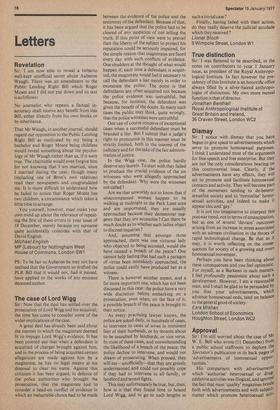The case of Lord Wigg
Sir: Now that the dust has settled over the prosecution of Lord Wigg and his acquittal, the time has come to consider some of the wider implications of the case.
A great deal has already been said about the manner in which the magistrate deemed fit to impugn Lord Wigg's evidence. It has been pointed out that when a defendant is acquitted of charges brought against him, and in the process of being acquitted certain, allegations are made against him by a magistrate, he has no legal means at his disposal to clear his name. Against this criticism it has been argued, in defence of the police authorities who brought the prosecution, that the magistrate had to consider a head-on conflict of evidence in which an ineluctable choice had to be made between the evidence of the police and the testimony of the defendant. Because of that, it has been argued that the police had to be cleared of any suspicion of not telling the truth. If this point of view were to prevail then the liberty of the subject to protect his reputation could be seriously impaired, for the simple reason that magistrates are faced every day with such conflicts of evidence. One shudders at the thought of what would happen if, each time a defendant is acquitted, the magistrate would feel it' necessary to call the defendant a liar merely in order to exonerate the police. The point is that defendants are often acquitted not because the police evidence was untruthful, but because, for instance, the defendant was given the benefit of the doubt. In many such cases the public may think, quite wrongly, that the police witnesses were untruthful.
One can of course conceive of exceptional cases when a successful defendant must be branded a liar. But I submit that a judge's right to pronounce in this manner must be strictly limited, both in the interest of the judiciary and for the sake of the fair administration of justice.
In the Wigg case, the police hardly deserve any laurels. To start with they failed to produce the crucial evidence of the six witnesses who were allegedly approached by the defendant. Why were the witnesses not called ?
Are we that unworldy not to know that if unaccompanied women happen to be walking at midnight in the Park Lane area and are importuned, they are usually approached because their demeanour suggests that they are accessible? Can there be much doubt as to whether such ladies object to discreet inquiries ?
And, assuming that amongst those approached, there was one virtuous lady who objected to being accosted, would she have caused a breach of the peace? One cannot help feeling that had such a paragon of virtue been mistakenly approached, the police could easily have produced her as a witness.
There is however another aspect, and a far more important one, which has not been discussed in this case: the police have a very wide discretion before embarking on a prosecution, even when, on the face of it, a possible breach of the peace is brought to their notice.
As every practising lawyer knows, the police are asked daily, in hundreds of cases, to intervene in cases of wives in imminent fear of their husbands, or by tenants about to be assaulted by landlords, or vice versa. In most of these cases, and notwithstanding the likelihood of a breach of the peace, the police decline to intervene, and would not dream of prosecuting. When pressed, they will say—unofficially--that they are grossly undermanned and could not possibly cope if they had to intervene in all family, or landlord and tenant fights.
This may unfortunately be true, but, then, how is it that they found time to hound Lord Wigg, and to go to such lengths in


































 Previous page
Previous page